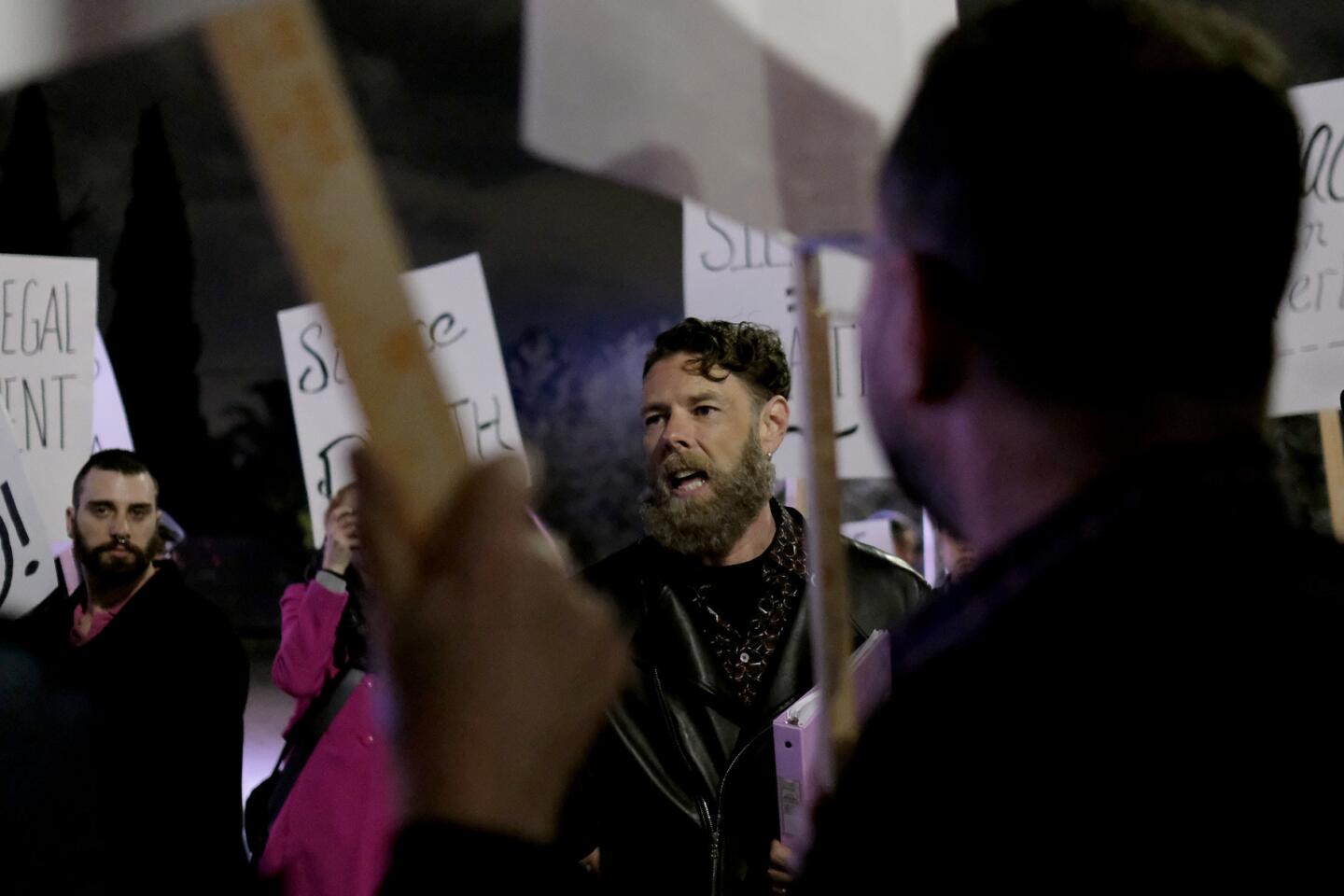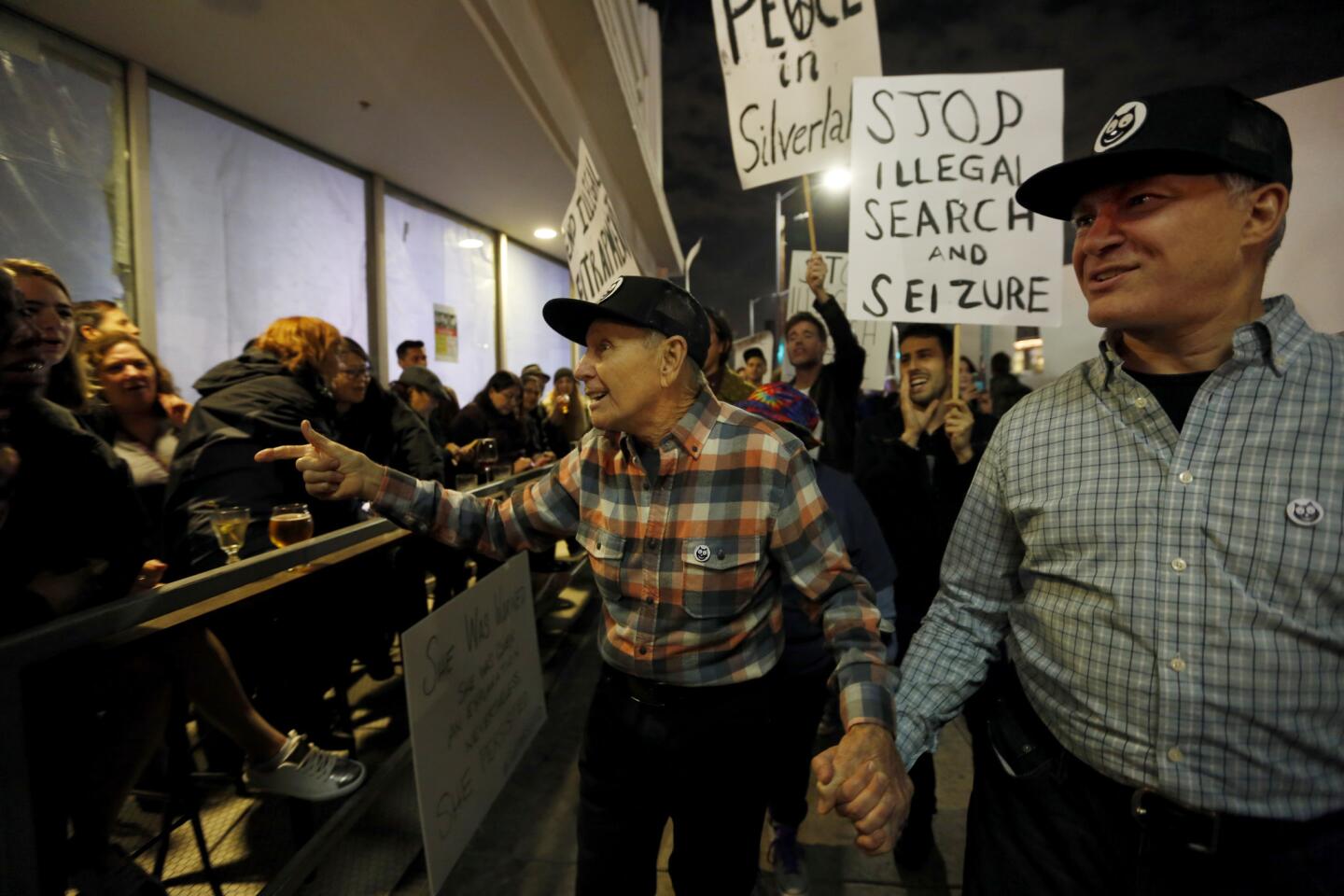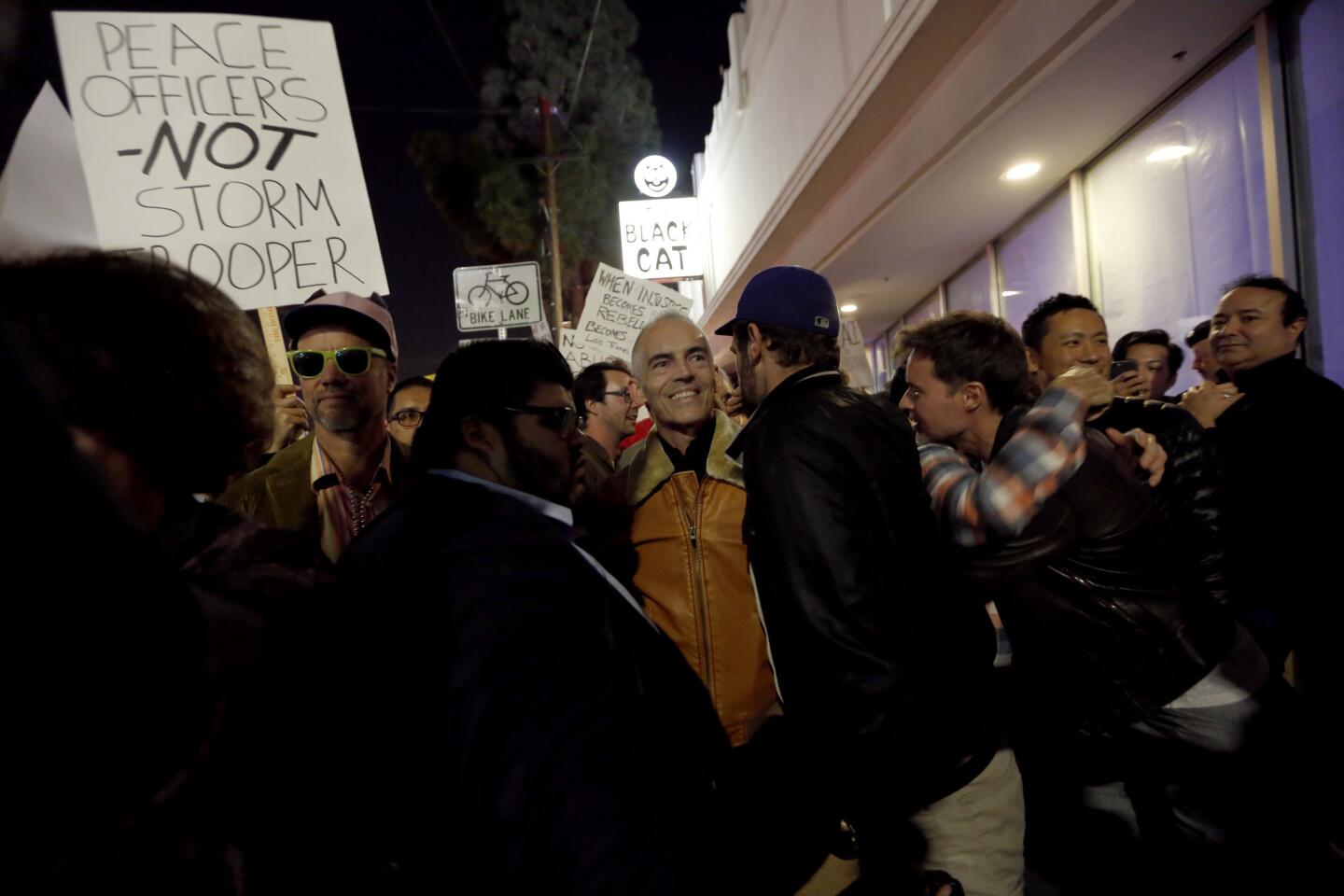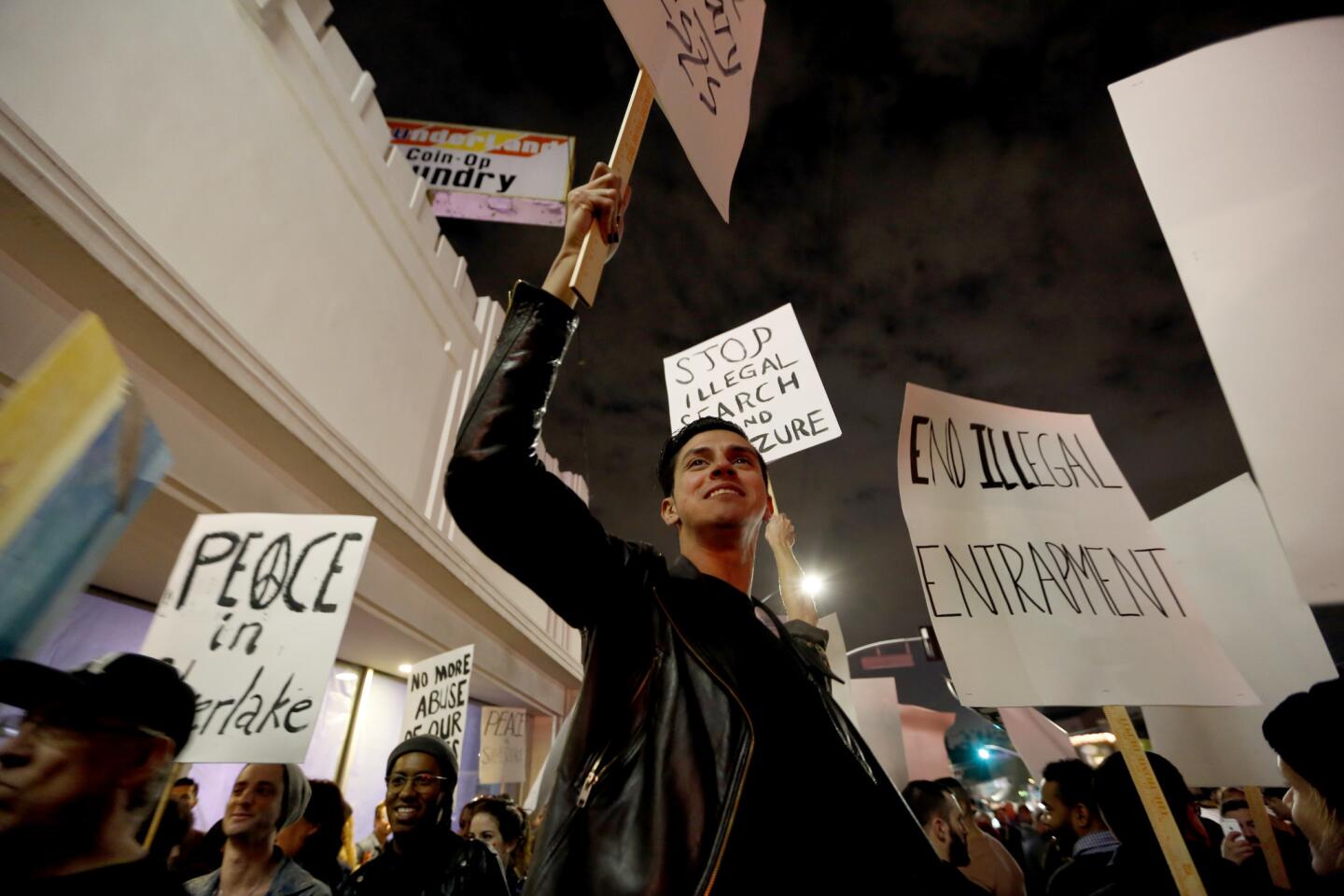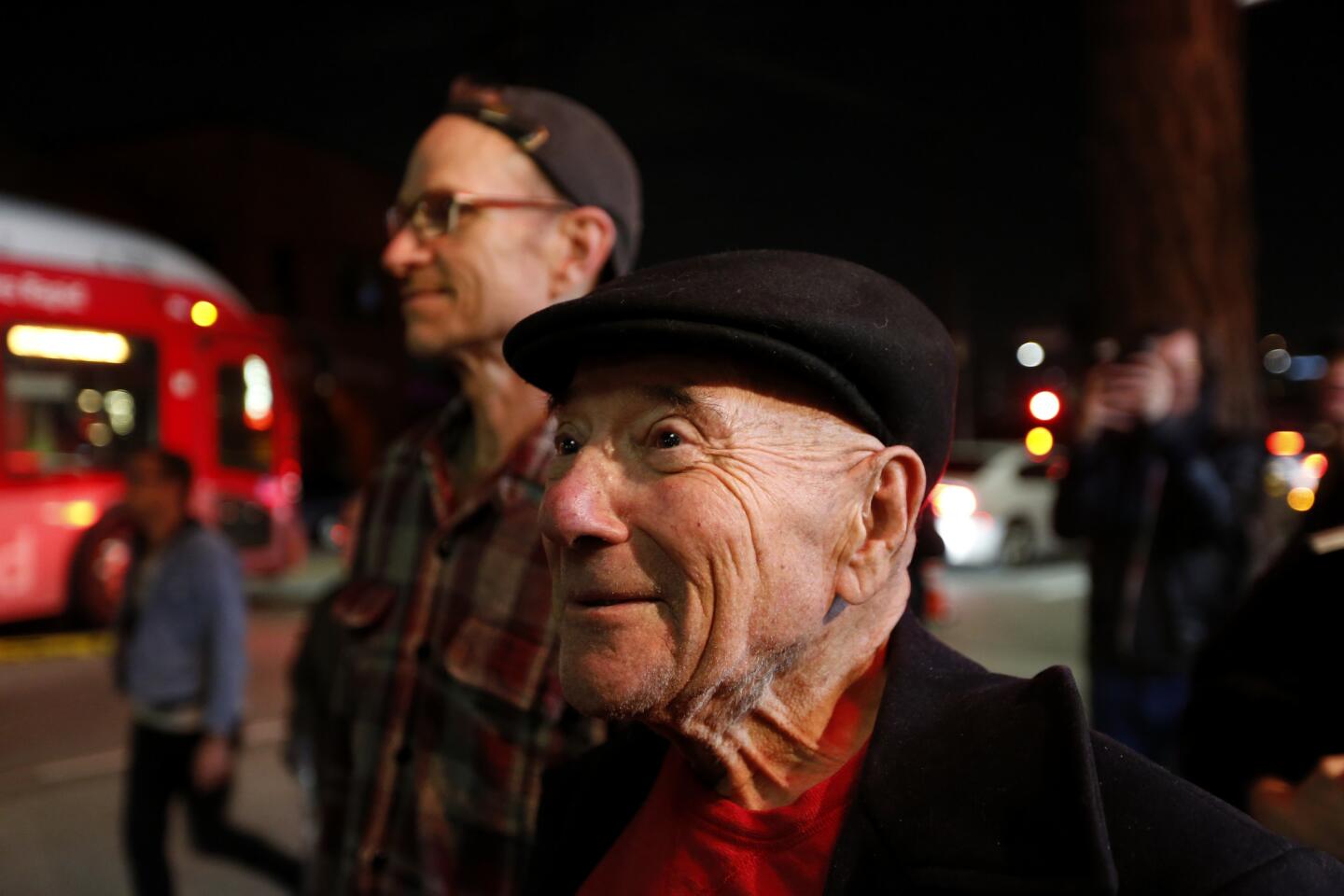Fifty years later, Silver Lake tavern stands as a monument to L.A.’s gay rights movement
- Share via
Alexei Romanoff woke up to a frantic phone call in the middle of the night. There had been an undercover police raid at the Black Cat tavern, a Silver Lake gay bar. It had turned violent.
It was Jan. 1, 1967. The band had just wrapped up “Auld Lang Syne,” and plainclothes officers hiding in the crowd pounced when men began exchanging the traditional midnight kiss to ring in the new year. At least 14 people were arrested and accused of lewd conduct. Several were badly beaten.
So, Romanoff and other activists did something bold for an era in which being openly gay could cost people their families, jobs and homes. On Feb. 11, 1967, they held a large public gay rights demonstration that pre-dated the famous Stonewall riots in New York City by two years.
“No longer were we saying, ‘Leave us alone and we’ll be quiet,’” Romanoff said.
On Saturday night, the 50th anniversary of the demonstration, they marched again outside the Black Cat on Sunset Boulevard, carrying picket signs with the same words as those in the black-and-white photos of the original protest.
“Silence = Death,” the signs read. “Peace in Silverlake.” “Stop illegal search and seizure.” “Blue fascism must go.”
For many, it was a poignant time to be reenacting the protest. Advocates say the Trump administration has stirred new anxieties in the LGBT community, and many fear discrimination — the loss of their jobs or housing or the denial of services because of their sexual orientation or gender identity — will become more broadly allowed under the guise of religious freedom.
Few took comfort in a statement by the White House last month that Trump “continues to be respectful and supportive of LGBTQ rights” after a draft of a potential executive order circulated around Washington calling for a scrapping of Obama-era workplace protections for LGBT federal employees.
“It’s a really interesting juxtaposition and a reminder that even though it’s been 50 years since the Black Cat and we’ve come a long way, our work isn’t done,” said Lorri L. Jean, chief executive of the Los Angeles LGBT Center.
Nearly two years ago, when the U.S. Supreme Court cleared the way for nationwide same-sex marriage, many people thought the fight was won and questioned if there was even a need for LGBT centers anymore, Jean said. They’re not asking that now.
The Los Angeles LGBT Center’s mental health professionals have been inundated with clients overwhelmed by anxiety, and in the days after the election, young people in the center’s homeless program were in tears, fearful it would close and they would be back on the streets, Jean said. Staff, too, have been concerned that the millions of dollars in federal funds the center receives would be stripped away, she said.
“There is reason to be fearful,” Jean said. “We are going to have to fight back and resist, at every opportunity, attempts to repeal our rights or rescind our progress.”
Los Angeles City Councilman Mitch O’Farrell, who helped organize the Black Cat anniversary event, said there were similarities in what’s happening today and what happened the night of the protest in Silver Lake.
“They demonstrated in an organized fashion in an unprecedented way in 1967, and I feel there’s a real parallel to the current resistance,” said O’Farrell, who represents Silver Lake and is gay. “Fifty years ago, there was a resistance to authoritarian rule at the local level from the police … and there are parallels to what we’re feeling today with this administration.”
On Saturday night, those gathered outside the Black Cat repeatedly broke into chants of, “We’re not going back!”
As people dressed in 1960s-era clothing marched in front of the bar, Joseph Levy, an 87-year-old Silver Lake resident who is gay, watched and smiled to himself.
“I think in some ways, Trump in all his insanity has brought everyone together, with the women’s marches and the airports and now this,” Levy said.
Romanoff, who is now 80 and the only living organizer of the original protest, marched with the crowd, holding his husband’s hand and chanting with gusto.
The New Year’s 1967 police raid had stunned Los Angeles’ burgeoning gay community, he said.
Romanoff had previously co-owned a Sunset Boulevard gay bar down the street from the Black Cat called New Faces. Just like at the Black Cat, the windows were darkened and the bar operated discreetly.
The night of the raid, two men fled the Black Cat and ran into New Faces. Police chased and arrested them there. That bar’s then-owner, Romanoff said, was a woman named Lee Roy.
When police asked who the New Faces owner was, they mistakenly heard “Leroy” and assumed she was a man in drag; they broke her collarbone and beat her so badly she was hospitalized, Romanoff said. Officers also dragged the bartender across the room and ruptured his spleen, he said.
Two of the men arrested that night, accused of lewd conduct for kissing another man, were found guilty by a jury and were registered as sex offenders. The men appealed, asserting the right of equal protection under the law, but the U.S. Supreme Court did not accept their case.
Romanoff was a member of the newly formed group that orchestrated the demonstration a month after the raid, called Personal Rights in Defense and Education, or PRIDE. They organized by secret phone tree, with each member calling 10 or 20 people, and each of those calling more. There were many, Romanoff said, who politely declined, fearful of being publicly outed.
Still, hundreds of people gathered that February night. Romanoff recalls the car ride to the demonstration with other PRIDE members as a silent drive. People were terrified.
“If you look at those old photographs, no one is smiling,” Romanoff said. “No one is laughing. There was anger, there was fear, but there was determination.”
Demonstrators that night were mindful not to do anything that could get them arrested by the police officers keeping watch. They didn’t dare step off the sidewalk and into the street.
They kept moving so they couldn’t be accused of loitering. They kept quiet so they couldn’t be accused of disturbing the peace. If someone dropped the leaflets they handed out, they quickly picked them up so they couldn’t be accused of littering.
Fifty years later, much had changed. Saturday night, a police officer clutching a cup of coffee smiled at the reenactment and said to a passerby, “This is great, isn’t it?” He then offered to take a photograph of a man and his wife, who clutched a sign.
Romanoff shook officers’ hands and gave them hugs as passing drivers honked in support.
Twitter: @haileybranson
More to Read
Sign up for Essential California
The most important California stories and recommendations in your inbox every morning.
You may occasionally receive promotional content from the Los Angeles Times.
